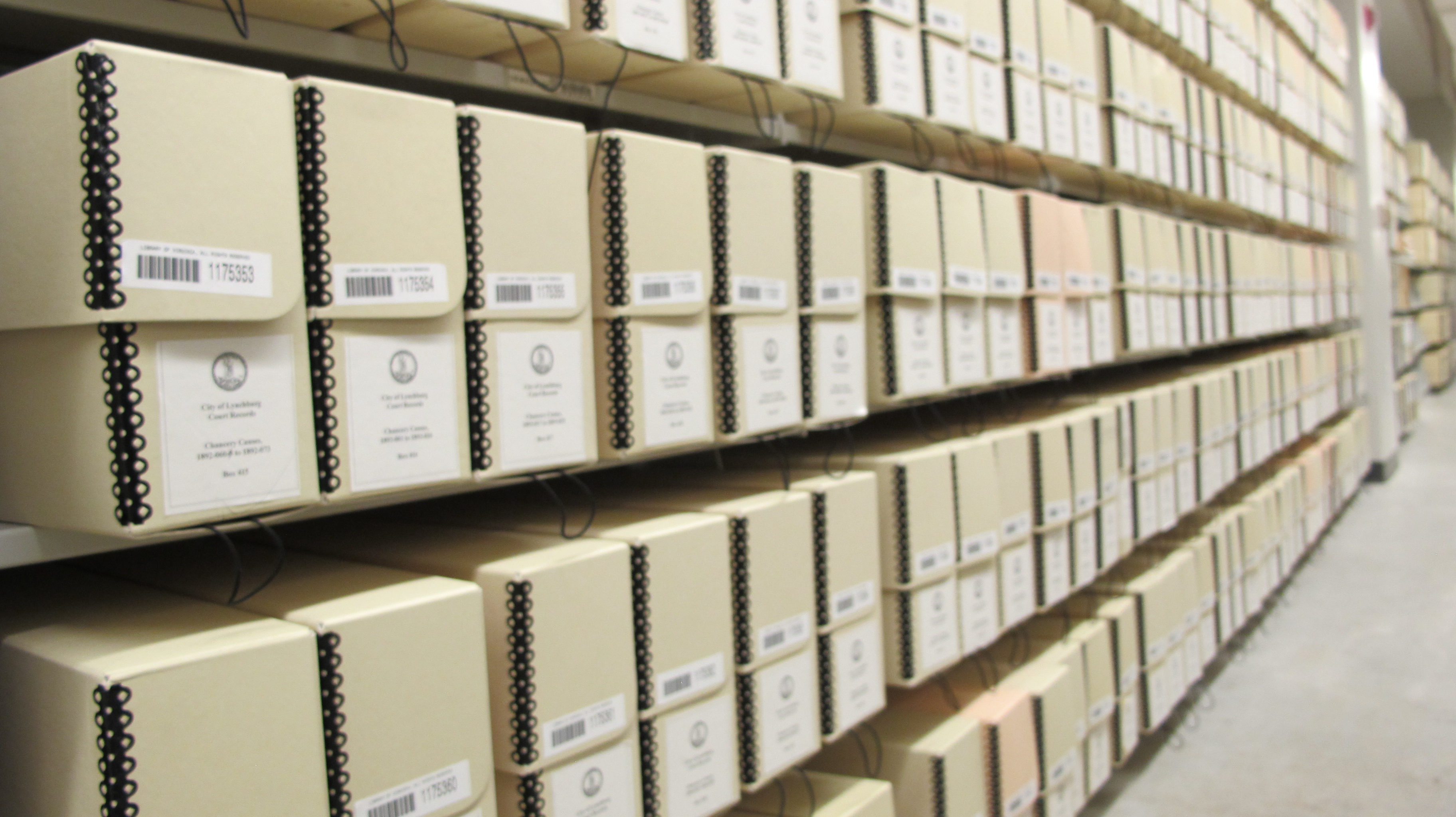Additional Prince Edward County chancery causes are now available on the Chancery Records Index. These additions span the years 1754 through 1883. Combined with the previously released images for Prince Edward County, the locality’s chancery causes have been digitized for the years 1754 through 1913.
Chancery cases are especially useful when researching local history, genealogical information, and land or estate divisions. They are a valuable source of local, state, social, and legal history and serve as a primary source for understanding a locality’s history. Chancery causes often contain correspondence; property lists, including slaves; lists of heirs; and vital statistics, along with many other records. Some of the more common types of chancery causes involve divisions of the estate of a person who died intestate (without a will); divorces; settlements of dissolved business partnerships; and resolutions of land disputes.
Here are a few of the cases you will find in the newly updated Prince Edward County chancery collection. To see more suits, go to the EAD guide and choose “Selected Suits of Interest” on the menu at the left.
- 1755-001– Bridget Braithwaite by etc. v. Edward Braithwaite. The wife sued for separate maintenance. Her husband abandoned her and was cohabiting with Joanna Sinclair, “a woman of ill fame and reputation” in the same parish and county. Bridget Braithwaite and her small children “are likely to be reduced to the utmost Distress of Indigence & poverty having nothing to support &* maintain her self & children but what she gets by her own labour which is very Little being upwards of 47 years of age and very infirm.” The court ordered an inventory of the husband’s estate.
- 1779-003 – Legts. Of Charles Rice v. Charles Chattrel, etc. The suit contains a detailed bill showing the cost of building a house.
- 1805-013 – Peter Fore v. Peter Kelso, Gdn., etc. The suit is about a dispute concerning the handling of two children of an enslaved woman who was sold. Two of her young enslaved children were to be given to another heir when they came of age.
- 1805-015 – Jesse Hamlett v. Exrs. of George Moore. A suit about a dispute over title to land. The defendants claimed the land was given to the plaintiff only on condition he “behave himself well and quit drink”
- 1808-011 – Samuel Carter v. Exx. of Wadill Carter. The bill contains a description of the operation of a brandy still, inherited from the father.
- 1810-016 – Richard Burks v. Richard Keeling. The suit contains a detailed bill for blacksmith work.
- 1811-005 – George Davidson v. Exr. Of Richard Blanton. Concerns a dispute about a slave who tried to return to the place where she grew up.
- 1811-010 – John White & Wife v. Andrew Porter. The plaintiffs sue for the woman’s dower rights. The defendant says the wife is not entitled because she left her husband and went to live with a man in adultery and is doing the same with a second man. This case contains many depositions about the conduct of the woman.
- 1811-013 – Aaron~ v. Exr. of Andrew Baker. In this freedom suit the plaintiff alleges his owner freed him in exchange for wages he earned while hired out. Aaron wasn’t named in the owner’s will. The suit contains an interesting answer from Andrew Baker’s widow about his desire to emancipate his slaves and decision to wait to tell them for fear the slaves would find out that their freedom depended on his death.
- 1825-010 – Admr. of Samuel Dodson v. Francis Thackston. The case contains correspondence describing the battle at Craney Island in the War of 1812.
- 1837-034 – Adms. Of Alexander Legrand, etc. v. Josiah Legrand, Comt., vs. Sarah Legrand. This is a large suit that contains records of marriage and register of births for the Legrand family. There is also a record of enslaved African Americans born in the eighteenth century.
- 1843-012 – Zackariah Goodman v. Trsts. Of Appomattox Co. The case involves a proposal to construct locks to improve navigation of the Appomattox River.
- 1847-011 – Fanny Bowman v. Exr. Of Philip Bowman. A free African American was married to an enslaved woman owned by the Venable family. He tried to leave her property at his death. Philip Bowman was employed to manage a corn mill owned by the Venable family. When he died, his mother sued for the property, arguing the widow was a slave and could not inherit it. The Venable family tried to protect the widow’s interests by promising to care for her, but later they put her in the poor house to live out her days there.
To date, The Library of Virginia has posted over 5.6 million digital chancery images. Additional localities are presently being scanned and will be posted in the coming months. However, because of reductions to the Library of Virginia’s budget in recent years, the pace of the agency’s digital chancery projects will necessarily proceed more slowly. Please know these projects remain a very high priority for the agency and it is hoped that the initiative can be resumed in full when the economy and the agency’s budget situation improve. Please see the Chancery Records Index for a listing of the available locality chancery collections.






